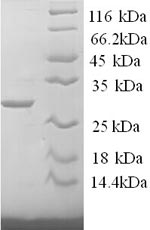Mouse Tryptase Recombinant Protein Product Attributes
Product Type: Recombinant Protein
Recombinant Tryptase based upon sequence from Mouse
Host: QP6831 protein expressed in E.coli, Yeast..
Tag: His
Protein Construction: A DNA sequence encoding the Mus musculus (Mouse) Tryptase, was expressed in the hosts and tags indicated. Please select your host/tag option, above.
Recommended Applications: Immunogen, Protein Standard, Cell culture, or Other Cell Biology Applications.
Application Notes: Please contact us for application specific information for QP6831.
Bioactivity Data: Untested
Full Length? Partial (see sequence information for more details).
Expression Region: Ala35 – His267
Amino Acid Sequence: AHGNKWPWQV SLRANDTYWM HFCGGSLIHP QWVLTAAHCV GPDVADPNKV RVQLRKQYLY YHDHLMTVSQ IITHPDFYIV QDGADIALLK LTNPVNISDY VHPVPLPPAS ETFPSGTLCW VTGWGNIDNG VNLPPPFPLK EVQVPIIENH LCDLKYHKGL ITGDNVHIVR DDMLCAGNEG HDSCQGDSGG PLVCKVEDTW LQAGVVSWGE GCAQPNRPGI YTRVTYYLDW IHH
Purity: Greater than 90% as determined by SDS-PAGE.
Reconstitution Instructions: Concentrated protein in liquid format. Reconstitution is not necessary.
Concentration of Mouse Tryptase Protein:
Endotoxin Levels: Not determined.
Buffer: Tris-based buffer, 50% glycerol
Storage Conditions: Store at -20C to -80C.
| Recombinant Mouse Tryptase Protein General Information | |
|---|---|
| Alternate Names | |
| Mcp-7, Mcpt7, MMCP-7, Mcp7 | |
| Curated Database and Bioinformatic Data | |
| Gene Symbol | Tpsab1 |
| Entrez Gene ID | 100503895 |
| RefSeq Protein Accession(s) | NP_112464.4 |
| RefSeq mRNA Accession(s) | NM_031187.4 |
| UniProt ID(s) | Q02844 |
| UniGene ID(s) | Mm.3301 |
| COSMIC ID Link(s) | Tpsab1 |
| KEGG Gene ID(s) | mmu:100503895 |
| General Description of Recombinant Mouse Tryptase Protein. | |
| Tryptase is the major neutral protease present in mast cells and is secreted upon the coupled activation-degranulation response of this cell type. | |
Limitations and Performance Guarantee
This is a life science research product (for Research Use Only). This product is guaranteed to work for a period of two years when stored at -70C or colder, and one year when aliquoted and stored at -20C.




There are no reviews yet.